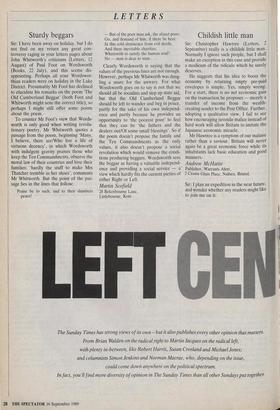LETTERS Sturdy beggars
Sir: I have been away on holiday, but 1 do not find on my return any great con- troversy raging in your letters pages about John Whitworth's criticisms (Letters, 12 August) of Paul Foot on Wordsworth (Books, 22 July), and this seems dis- appointing. Perhaps all your Wordswor- thian readers were on holiday in the Lake District. Presumably Mr Foot has declined to elucidate his remarks on the poem 'The Old Cumberland Beggar' (both Foot and Whitworth might note the correct title), so perhaps I might still offer some points about the poem.
To counter Mr Foot's view that Words- worth is only good when writing revolu- tionary poetry, Mr Whitworth quotes a passage from the poem, beginning 'Many, I believe, there are/Who live a life of virtuous decency', in which Wordsworth with indulgent gravity praises those who keep the Ten Commandments, observe the moral law of their countries and love their families: 'hardly the stuff to make Mrs Thatcher tremble in her shoes', comments Mr Whitworth. But the point of the pas- sage lies in the lines that follow:
Praise be to such, and to their slumbers peace! — But of the poor man ask, the abject poor; Go, and demand of him, if there be here In this cold abstinence from evil deeds, And these inevitable charities, Wherewith to satisfy the human soul? No — man is dear to man . .
Clearly Wordsworth is saying that the values of the previous lines are not enough. However, perhaps Mr Whitworth was dang- ling a snare for the unwary. For what Wordsworth goes on to say is not that we should all be socialists and step up state aid, but that the Old Cumberland Beggar should be left to wander and beg in peace, partly for the sake of his own independ- ence and partly because he provides an opportunity to 'the poorest poor' to feel that they can be 'the fathers and the dealers out/Of some small blessings'. So if the poem doesn't propose the family and the Ten Commandments as the only values, it also doesn't propose a social revolution which would remove the condi- tions producing beggars. Wordsworth sees the beggar as having a valuable independ- ence and providing a social service — a' view which hardly fits the current pieties of either Right or Left Martin Scofield
28 Bekesbourne Lane, Littlebourne, Kent.


































































 Previous page
Previous page